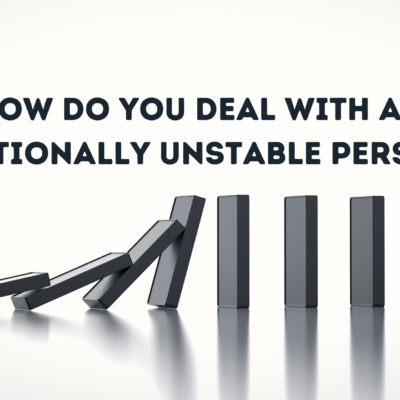How do You Deal With an Emotionally Unstable Person: Dealing with emotionally unstable people can be challenging and emotionally taxing. Whether it’s a friend, family member, coworker, or partner, understanding how to handle these relationships is important for maintaining your well-being and encouraging a healthier dynamic. In this article, we will talk about the strategies for dealing with emotionally unstable people.
Also Read:
- How to Deal with Emotional Wounds?
- Top Strategies for Dealing with Negative Emotions.
- How To Get Over Your Insecurities and Jealousy?
- I Am Afraid To Be Alone- Causes and Prevention Tips.
What is Emotional Instability?
Before talking about the strategies for dealing with emotionally unstable people, it’s important to understand the concept of emotional instability. Emotional instability means heightened and unpredictable emotional reactions that may be triggered by different factors such as stress, trauma, mental health issues, or personal challenges.
Understanding that emotional instability is usually a symptom rather than a conscious choice is a key part of approaching these situations with empathy and understanding.
How do You Deal With an Emotionally Unstable Person?
Practice Empathy
Empathy is the basic step when dealing with emotionally unstable people. Try to understand the person’s mindset and emotions without judgment. Accept their feelings, and let them know you are there to support them. Empathy creates a basis for trust and open communication, it is a necessary component for encouraging healthier relationships.
Active Listening
Actively listening to an emotionally unstable person can give them a sense of validation and understanding. Allow them to express their thoughts and feelings without interruption and judgment. Talk with them with phrases like “It sounds like you’re feeling…” or “I hear that this is important to you,” demonstrating your commitment to understanding their experience.
Maintain Calmness
Emotional instability can create a charged atmosphere, and it is important to stay calm and collected. Getting all worked up can make things worse. By staying calm, you not only show how to control your emotions but also make it easier for the person to share their feelings in a stable environment.
Set Boundaries
Setting clear and healthy boundaries is important when dealing with emotionally unstable people. While empathy is important, it’s equally essential to protect your well-being. Respectfully communicate your limits, making it clear what behaviors are acceptable and what is not. Constant and firm boundaries contribute to a more balanced relationship.
Encourage Professional Help
If the emotional instability is intense and impacts the person’s life greatly, you can suggest seeking professional help. Mental health professionals can provide the necessary support and tools to handle underlying issues. Offer your help in finding resources or accompanying them to appointments if they are willing.
Avoid Triggering or Rude Language
Be mindful of the language you use while talking to such a person, as certain words or phrases may trigger their emotional responses. Choose your words carefully, concentrating on neutral and non-confrontational communication. Avoid making comprehensive judgments or assumptions and opt for language that enables understanding.
Provide Reassurance
Emotionally unstable people may grapple with feelings of insecurity or fear of rejection. Offering reassurance can be a powerful tool in helping them feel understood and accepted. Reassure them that you value the relationship and are committed to finding productive solutions together.
Enable Self-Reflection
Enabling self-reflection as a tool for personal growth can be helpful. Enable the person to explore their emotions, triggers, and coping tools. Self-awareness is an important step toward emotional stability, and keeping this process can authorize them to take control of their well-being.
Offer Practical Support
Sometimes, emotional instability may be worsened by external stressors. Offering practical support, such as helping with daily tasks, providing resources, or helping in problem-solving, can relieve some of the pressures they may be confronting. Practical assistance gives emotional support which helps in creating a more holistic approach.
Concentrate on Solutions
Redirect the focus of conversations towards constructive solutions rather than dwelling solely on the emotional upheaval. Discussing practical steps to handle challenges can authorize the person to take possession of their situation. Collaborative problem-solving can be an optimistic and forward-looking strategy.
Know When to Step Back
Identify your limits and know when it is important to step back from the situation. If your well-being is constantly compromised or the person denies to engage constructively, it may be suitable to reassess the dynamics of the relationship. Prioritize your mental and emotional health.
At The End
Dealing with an emotionally unstable person needs a balance of empathy, communication, and self-care. Understanding the root causes of emotional instability, and practicing the above-mentioned strategies can help create a healthy relationship.
It’s essential to recognize that you are not responsible for fixing or handling someone else’s emotions completely. Emotional stability is a personal journey, and while you can offer support, the person must take ownership of their well-being.
By handling these relationships with compassion, patience, and a focus on productive solutions, you can contribute to a healthier dynamic and, in some cases, ease the path toward emotional peace for the person involved.








